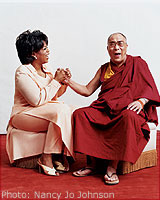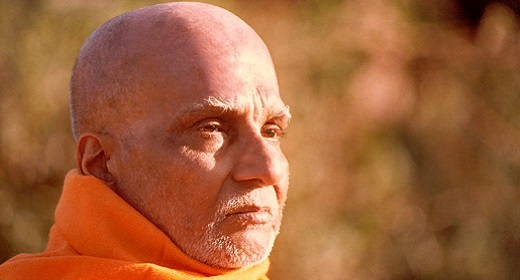by Oprah: He calls himself “a simple Buddhist monk”—a man who rises at 4 A.M. and spends hours each day in prayer and meditation.

Yet his nonviolent efforts to free his country, Tibet, have made His Holiness the Dalai Lama an international symbol of peace during the past four decades. In the 46 countries the Dalai Lama has been invited to visit, thousands of people have flocked to hear him speak on what he believes is his most meaningful message—that compassion toward others is the surest path to happiness.
Born Lhamo Thondup in 1935 in the Tibetan village of Taktser, he was first recognized as the 14th Dalai Lama—the reincarnation of the 13th Dalai Lama—at the age of 2. (Several signs led a group of monks, who had been on a two-year search for their next leader, to the toddler.) The boy was taken to a nearby monastery for a year and a half and then moved to Lhasa, the capital of Tibet, with his family when he was 4. There, tutors prepared him to one day assume spiritual and political guidance of his country.
In 1950 the Dalai Lama was forced to take on that role at the age of 15, two years ahead of schedule. In an act of unprovoked aggression, China invaded and overtook Tibet. The Dalai Lama’s peaceful attempts to regain his country’s autonomy were to no avail. In 1959 tension between the Tibetans and the Chinese became so intense that, on the heels of violent outbreaks he had tried to prevent, the Dalai Lama fled for asylum in nearby India. More than 120,000 Tibetans have since followed. It is there, from the city of Dharamsala, that His Holiness has led the Tibetan people for 42 years.
It has not been a silent exile. During his early years in India, the Dalai Lama put forth a democratic constitution for a future free Tibet, based on Buddhist principles and the Universal Declaration of Human Rights adopted by the United Nations. In Washington, D.C., at the 1987 Congressional Human Rights Caucus, he proposed a plan calling for the designation of Tibet as a zone of peace and for an end to the massive transfer of ethnic Chinese into his country. In 1989 he was awarded the Nobel Peace Prize. He has written more than 35 books, including The Art of Happiness (Riverhead Books), which has been a best-seller in the United States since 1998.
I met with His Holiness during one of his many trips to Washington, D.C., a trip that also included his visit with President Bush at the White House. About a dozen Buddhists in colorful Tibetan attire waited in the hallways of the hotel where the Dalai Lama stayed, hoping for a chance to hear him speak. In our time together, we talked about everything from whether he harbors any regrets to what he considers a good day—and how every person can find the secret to a joyful life.
 Oprah: Though many Americans have read your book about happiness, some still don’t understand how to achieve it. How can someone attain true happiness in a culture that emphasizes materialism?
Oprah: Though many Americans have read your book about happiness, some still don’t understand how to achieve it. How can someone attain true happiness in a culture that emphasizes materialism?
Dalai Lama: Even when a person has all of life’s comforts—good food, good shelter, a companion—he or she can still become unhappy when encountering a tragic situation. Physical comforts cannot subdue mental suffering, and if we look closely we can see that those who have many possessions are not necessarily happy. In fact, being wealthy often brings even more anxiety. On the other hand, those who don’t have a life filled with luxury may have a home filled with compassion, based on their choice to be content and to practice self-discipline. Even when we have physical hardships, we can be very happy.
Oprah: So happiness begins in our minds?
Dalai Lama: Yes. That’s why mental happiness is more important than physical comfort. Physical comfort comes from the material. But material facilities cannot provide you with peace of mind.
Oprah: That’s right.
Dalai Lama: When you are discontent, you always want more, more, more. Your desire can never be satisfied. But when you practice contentment, you can say to yourself, “Oh yes—I already have everything that I really need.”
Oprah: What I took away from The Art of Happiness is that compassion is the key to tranquility and peace of mind. But how can you be compassionate toward others when you yourself are suffering?
Dalai Lama: When a person is in a miserable situation, then, yes, it is difficult to develop genuine compassion toward others. That’s why I find it difficult to say to poor people, “Please have compassion toward millionaires.” That’s not easy. And yet even the rich have their own kind of suffering, anxiety, doubt, and fear. So in many cases, wealthy people aren’t happy! And once those with material wealth encounter small difficulties, their amount of mental suffering is sometimes bigger than it is for those who have faced such difficulties every day.
Oprah: Is Buddhism a path to happiness?
Dalai Lama: Certainly—though some people get the impression that Buddhism talks too much about suffering. In order to become prosperous, a person must initially work very hard, so he or she has to sacrifice a lot of leisure time. Similarly, the Buddhist is willing to sacrifice immediate comfort so that he or she can achieve lasting happiness. And in order to develop the willpower it takes to sacrifice, you must first realize that spending all your time and energy pursuing material comforts means you will eventually suffer. It’s all about positive and negative consequences. It’s very important to be aware that there are long-term consequences [for every action].
Oprah: Though you believe that Buddhism is a path to happiness, you’ve encouraged others to remain in their own faiths. True?
Dalai Lama: That’s right. I always emphasize that it is much safer and better to keep one’s own religious faith. The other major religions are thousands of years old and have long traditions.
Oprah: Do you believe that someone can be a Christian and still practice Buddhism?
Dalai Lama: Yes, I think so. There are techniques of Buddhism, such as meditation, that anyone can adopt. And, of course, there are Christian monks and nuns who already use Buddhist methods in order to develop their devotion, compassion, and ability to forgive.
Oprah: What function does religion serve in our lives?
Dalai Lama: It helps us to develop compassion, caring, and, I think, a sense of purpose.
Oprah: And what is our purpose here on earth?
Dalai Lama: To help one another.
Oprah: So the whole reason we are on this planet is to serve each other?
Dalai Lama: That’s right.
Oprah: Can a person be good without practicing religion?
Dalai Lama: Yes. And he or she can also be happy.
Oprah: Is it possible for everyone to be happy?
Dalai Lama: It is possible—absolutely. And it is worthwhile for one to make an effort to achieve happiness. Just as the purpose of a plant is to grow, so it is that the main purpose of every human being is to survive and to grow until death. As far as mental development is concerned, we should never be complacent. We can develop our minds infinitely—there is no limitation. Many of us are discontent with how many possessions we have, but we’re content when it comes to our spiritual development. That is the mistake we make.
Oprah: That’s big! If we all understood that our sole purpose is to help others, wouldn’t that change humanity?
Dalai Lama: Yes, and understanding that begins with changing our attitude. We must realize that it is best to focus on our oneness, to reemphasize what is the same about each of us rather than dwell on what is different. Yes, there are differences between us. But it doesn’t make sense to emphasize that, because my future and yours is connected with everyone else’s. So we have to take seriously our concern for all of humanity. When we focus on our individuality, humanity inevitably suffers. And once humanity suffers, each one of us will also suffer.
For example, a few minutes ago there was a fire alarm in this building. I responded immediately—not because this building is part of my body but because I am here, in it. That’s why I have to take care of it. Similarly, whether we love humanity or not, we must realize that we are part of it. My future depends entirely on the future of humanity, and so I am compelled to take care of humanity. That is why being compassionate is actually in my own best interest. And a symptom of my own peace of mind is that I can share comfort with others around me.
Oprah: Doesn’t practicing gratitude also affect our lives in the same way that compassion does?
Dalai Lama: That’s very true. When you practice gratefulness, there is a sense of respect toward others.
Oprah: True. Can we talk now about what it’s like to be you? When you were first discovered as the Dalai Lama, did you feel that there was something special about you?
Dalai Lama: No.
Oprah: There wasn’t a part of you that had always known you were different?
Dalai Lama: Sometimes, I do feel that, yes, I may feel some effect from previous lives. In the early mornings, when I am still half asleep and half awake, my mind is very clear. And when I am in this special twilight state, I have had glimpses of memory from past lives in which I identify with those from, in some cases, one or two centuries ago. I once had a feeling that I might have been in Egypt 600 years ago.
Oprah: Do you feel you’re different from most humans?
Dalai Lama: No, no, no.
Oprah: So like every other human, are you your own master?
Dalai Lama: Yes.
Oprah: But you are the master of no one else.
Dalai Lama: That’s true, too.
Oprah: Growing up, did you miss having a regular childhood?
Dalai Lama: Fortunately, I had playmates, though most of them were grown-ups.
Oprah: Have you ever wanted a family or children?
Dalai Lama: No. Well, when I was around 15 or 16, I had some interest. That was biological. But then some of my older playmates who were monks later became laypeople, and they told me about some of the complications of leading a family life. Of course, there can be great pleasure in having a family, but there are a lot of problems, too.
Oprah: I’ve read that you spend many hours a day in meditation. What value does meditation have for even non-Buddhists?
Dalai Lama: Meditation is valuable for all of humanity because it involves looking inward. People don’t have to be religious to look inside themselves more carefully. It is constructive and worthwhile to analyze our emotions, including compassion and our sense of caring, so that we can become more calm and happy. Hatred, jealousy, and fear hinder peace of mind. When you’re angry or unforgiving, for example, your mental suffering is constant. It is better to forgive than to spoil your peace of mind with ill feelings.
Oprah: You seem to have a lot of joy. What makes you happy?
Dalai Lama: I don’t take myself too seriously! That makes me happy.
Oprah: What is a perfect day for you?
Dalai Lama: There’s never a perfect day. There is no perfection in the world.
Oprah: So what would make a good day— a day when you really have fun and laugh a lot?
Dalai Lama: I really like gardening and playing with mechanical things. And when I have leisure time, I spend some of it reading and studying—mainly Tibetan Buddhist texts, as well as readings on my favorite subjects like compassion and altruism. On those days when I can spend a few hours getting some understanding, I feel fulfilled. I feel as if I have made good use of my time.
Oprah: Do you work so hard and travel so much because you want to bring attention to what is happening to the Tibetan people?
Dalai Lama: Not necessarily. Just this morning I read a newspaper that said something like “The Dalai Lama visited six cities in order to explain the Chinese oppression of Tibet.” That’s wrong. I have never been anyplace where I was not first invited. And upon invitation, if I feel that there is potential for making some contribution to humanity, I will comply in spite of being tired.
Oprah: Will you be unhappy if Tibet has not gained its independence before your death?
Dalai Lama: If I were to die today, I would have some concern for Tibet. But I know that I have personally done as much as I can to use my existence for others. So I have no regret.
Oprah: None?
Dalai Lama: That’s right.
Oprah: Have you ever had to forgive yourself for anything?
Dalai Lama: I’ve had to forgive myself for small incidents, like accidentally killing an insect. My attitude toward mosquitoes and bedbugs is not very favorable or peaceful!
Oprah: Have you ever had to forgive yourself for any big mistakes?
Dalai Lama: I make small mistakes every day. But major mistakes? It doesn’t seem so. I’ve examined my service to the Tibetan people and to humanity, and I’ve done as much as I can in my life.
Oprah: One last question: Every month I do a column in the magazine called “What I Know for Sure.” What do you know for sure?
Dalai Lama: Altruism is the best source of happiness. There is no doubt about that.







































